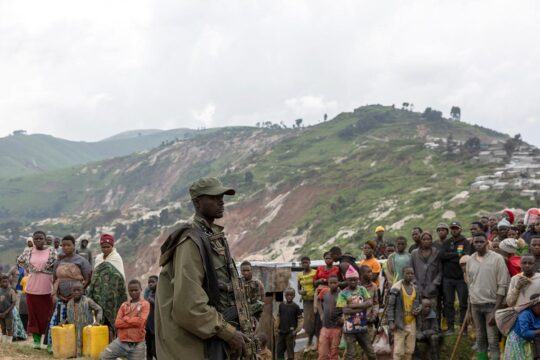People stayed home across Democratic Republic of Congo on Monday, leaving troops to patrol ghost cities as tension peaked hours before President Joseph Kabila's mandate ends, but with no election in sight.
Kabila's second term expires at midday on December 20, but he has shown no sign of stepping down and talks on a pre-election transition have failed, sparking fears of fresh political violence in the mineral-rich but unstable nation.
Normally teeming Kinshasa, the megacity capital of 10 million people, was a shadow of itself on Monday, with barely any traffic on the main roads, public transport at a minimum, and soldiers and police outnumbering passers-by.
Shops were shuttered in the main square and there were tense scenes at Kinshasa University, where dozens of police and troops held back hundreds of students, AFP journalists said.
In the volatile east, torn by two decades of armed conflict, five rebels, a South African peacekeeper and a Congolese police officer were killed when militia fighters attacked several buildings in Butembo, including the prison.
Kabila, who has been in power for 15 years, is constitutionally barred from seeking a third term but under a recent constitutional court order he may stay on until a successor is chosen.
The ruling party and some opposition leaders have agreed to schedule an election in April 2018, leaving Kabila in office until the vote. But the main opposition bloc rejects this.
In Kinshasa, journalists were prevented from entering the university grounds by security forces and irate students, but students reached by telephone said they had been planning "ot march peacefully" to parliament to demand Kabila step down.
Security was also tight in the second city, Lubumbashi, in the southeast, with most shops closed and very little traffic.
Social networks have been cut or filtered since midnight Sunday on orders from the authorities and police at the weekend banned gatherings of more than 10 people.
- Talks to resume Wednesday -
An AFP journalist saw police disperse a group of eight young people chatting on the street in Goma, in the east, where business too was at a standstill.
In a last-ditch bid to achieve a peaceful transfer of power, talks took place last week between the ruling party and fringe opposition groups allied against a mainstream opposition coalition led by 84-year-old Etienne Tshisekedi.
But despite more than a week of mediation they broke up on Saturday, with no progress on the main issues that divide the two sides.
Negotiations are due to resume on Wednesday when Catholic bishops acting as mediators return from a long-planned trip to Rome -- a day after the 45-year-old Kabila's term ends.
A democratic handover would break ground for Congo's 70 million people who since independence from Belgium in 1960 have never witnessed political change at the ballot box.
And in the last few years hundreds of people have died in political violence in the capital, Kinshasa, including 53 in anti-Kabila protests in September.
The president has been in power since his father Laurent Kabila was assassinated in 2001. He was elected in 2006, and again in 2011, in a poll the opposition decried as rigged.
Tshisekedi's opposition grouping has threatened to bring people into the streets from Monday if the talks failed.
Leaflets urging people to retake Kinshasa "street by street, district by district until we retake the whole of the DRC", have begun to circulate in the capital.
But so far the opposition has refrained from urging a general mobilisation, while the international community has pleaded for calm on all sides.
Some two decades ago, Congo sunk into the deadliest conflict in modern African history, its two wars in the late 1990s and early 2000s dragging in at least six African armies and leaving more than three million dead.



